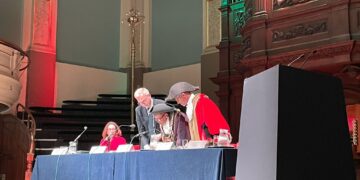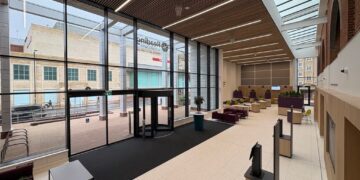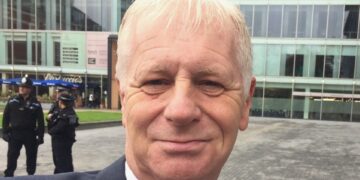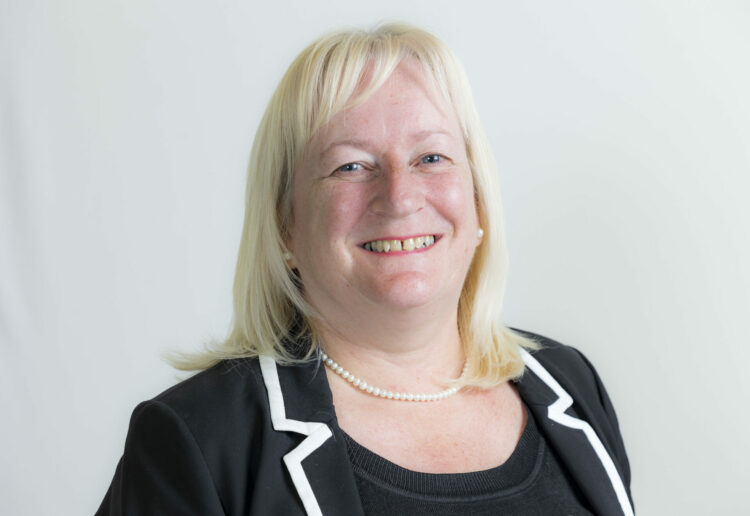READING has a new leader of the council, and it is the culmination of a journey that started several years ago.
At the annual council meeting held last night, Councillor Liz Terry was voted in by her colleagues while Cllr Glenn Dennis became the borough mayor.
It is quite a turning point for the ruling Labour group, as both the previous leader Jason Brock and mayor, Tony Page, stepped down – the latter after 51 years on the council. The chamber is full of new faces.
Cllr Terry grew up in Reading and says her family weren’t particularly political. Instead, her journey started as a mum getting back into work, with roles at Reading Borough Council.
“At one point in the 1990s, I was clerk to the Labour group, I sat in on the political meetings, and I was inspired by what they said,” she recalls. “I was a good and proper officer and had no political affiliations. But I was listening to how these councillors cared about Reading and the policies they wanted to enact to make Reading a better place.
“I kept away from joining for quite a long time because of the jobs I had. Then, when I wasn’t in local government, I felt able to join the Labour Party and stand for selection.”
Among her inspirations was the Blair/Brown government of New Labour from 1997 onwards. Cllr Terry says she could see the difference their policies were making to the country.
She moved on from the council and, between 2012 and 2019, was the chief executive of Berkshire Women’s Aid (BWA).
“I wanted to champion women’s rights – but it isn’t just women who are victims of domestic abuse and violence.
“Two women a week, on average, are being murdered by their husbands or partners, or a male known to them. It is a very particular crime committed against women. That’s not to deny other victims, but I’m focused on recognising that even though some great steps are being taken in the law, they aren’t all there yet.
“BWA is a 50-plus-year-old organisation that was about battered women, as they were called then, and creating a refuge for women and children to be safe. As time has gone on, it adapted.”
She had hoped that when Theresa May became prime minister, she would see through promises made on tackling violence against women and girls.
“I’m afraid she got distracted with lots of other things like Brexit,” Cllr Terry says.
“Injustice is a key thing for me. We can’t be doing well all the time, that’s life. But we need to know there are institutions, the government, the law, that are there for us at times we need help, and that when there is an injustice, justice will be served.”
At the same time as joining BWA, Cllr Terry was first elected to the council, originally in Minster ward, which was renamed as Coley in the 2022 boundary review.
“I love Coley dearly,” she says. “In Coley Park, there are still a lot of council housing tenants and we, as a council, need to make sure we’re doing right by them in terms of the housing revenue account and funding open spaces.
“Coley Rec is somewhere I played in as a child, so I know it from being a child. Sometimes when we were a bit older, we’d be brave in the summer holidays … we could go to our nearest, Cintra Park, or we could go to Coley Rec, a little bit of a further walk for us as kids.
“So I have memories of it, but now I’m an adult, I’m sure the hill in it used to be bigger.”
The Bath Road conservation area, including Downshire Square, was, Cllr Terry recalls, “always thought of as the posh bit… it’s got some interesting buildings, and is a lovely part of the ward to visit”.
A school friend lived in Western Elms Avenue, and visits to her meant an opportunity to train spot from her back garden.
“I’ve got lots of memories … but it’s always about the people. Whether they are council tenants or homeowners, whether it’s parking, or living in an area where there are lots of potential HMOs, it changes the feelings of roads and things.
“As a team of councillors, we’ve successfully updated all the play areas in our ward, tackled some of the road resurfacing, and got a new development on Wensley Road. That’s been quite trying … we can say it’s been worth it even though it’s been hard, because 46 households are going to get homes that are pretty much Passivhaus standard, so they’re really energy efficient, they’re good for the environment and they are really good quality homes. That is something we desperately need.
“We can be proud of that.”
Cllr Terry may have come into politics after a career working as a council officer first, but as a child she had her first taste of office: “I danced for the mayor of Reading when I was four, in the Old Town Hall before it was closed down and renovated.
“By the time I was seven, my Irish dancing teacher used to joke that one day, maybe, I’ll be the mayor of Reading. I remember thinking I don’t know what you’re talking about, I was still a child. But maybe this stuck in my head.
“I have no ambitions right now to be mayor, and I’m very surprised to find myself as leader this year,” she says, perhaps mindful of the work her partner, Cllr Tony Jones, put in when he served as the town’s first citizen in 2014-15.
Being leader is something she says is an honour and a privilege. She was nominated by her Labour colleagues, and the role sees her step up from the role of deputy.
“I don’t underestimate what I’ve got to live up to,” Cllr Terry says. “It’s exciting, but a little bit … I don’t want to use the word daunting … but unknown. Even if you watch other people be leader of anything, when you’re in the hot seats, it feels different.
“You are advocating for residents. We have a duty to be good stewards, run a good administration, and work with council officers to ensure the council runs efficiently.
“Our responsibility is to advocate for the people of Reading and the businesses of Reading.
“There is a tension between what you think is the right thing when you’re inside, working as a council officer, and what is the right thing in the real world.”
She hopes her administration will get that right.
And she will be able to turn to her predecessors and colleagues: “When Jason Brock decided to stand down, he offered to answer any questions I had; the same with Tony Page.
“I think there is a balance between not losing all that wealth of knowledge and being your own person, being who you want to be as leader and what the group wants me to do – the world moves on.
“I know I can’t do it all on my own, I need everybody’s support and help.”
This will translate into how she runs the council, evolving some parts, and trying new directions for others.
“In some ways, the things the council can do are the things that the council can do … they’re pretty much always the same sorts of things, aren’t they? The services we provide are similar, but how they translate into the future depends on the world that is presented to us.
“Reading is a really important town, the biggest in the south of England and it is a strategic place: we’re a bridging town because they transport links have always been good.
“But look at the high street: the world is changing; online shopping and those things have made it harder for people to do business. People are noticing that.”
She is working on a new town centre strategy which will look at what will change in the towns, and what residents will need going forward.
“I think there’s going to be a bit of a revolution about town centres across England and that is going to take a little bit of working out.
“If we are going to accept the reality that we need more homes, and developers want to spend money here, developing new homes in the town centre, then we need to build the place that matches the needs of the people who will be living here. There is some work going on at the moment.”
Reading, like many other local authorities, is facing financial challenges and having to find savings while protecting essential services such as adult social care. Cllr Terry says this doesn’t faze her.
“Most people won’t have escaped the fact that local authorities up and down the country have been struggling – 14 years of Conservative governments has seen austerity go on and on and on,” she says, adding that Reading has been receiving smaller and smaller amounts of funding from Whitehall since 2010.
Some of the funding has gone into a competitive grant process, and Reading has sometimes received money from those tenders. “In terms of our revenue support grant – the main money to come from the government – that is down to sort of next to nothing. It’s not very much when it used to be millions. It’s really, really tough on local government and there is no pretending about it.”
She says the 2016/17 budget was among the hardest in recent years, when the council had to cut back on services to protect others. “We worked really hard as a Labour administration to work with council officers, build back our resilience and ensure we could cope with any shocks to come. We have been very successful in doing that.”
The picture is not getting any easier: “Do I think I’m going to have a tough first year as leader? Yes, I do.”
Cllr Terry cites the increase needed for children’s services as an example. Due to demand, last year the budget was overspent by around £9 million. “We’ve had to build that into future budgets because we must acknowledge our statutory and moral duty to ensure children are safe and cared for.
“What we’ve got is a profiteering sector charging local authorities across the country way more than it really should do for some of these placements. That’s a thing the government must deal with, it can’t be dealt with in the local procurement market.”
Cllr Terry has hopes for change through the forthcoming general election and a change of national leadership.
“I feel optimistic that a Labour government will understand where the change is needed, where we need to be spending money, and the challenges local authorities face,” she says. “I believe that, over time, and working with the new government, we will be able to continue to build and ensure we protect frontline services and still have ambitions for improving Reading.”
Among those are some of her visions for the year ahead.
“The priority is to ensure Reading Borough Council is a solvent, thriving, good organisation that manages the challenges. We want to work with developers to get affordable housing. We need more, and we will work with council officers to think about our next steps towards our social housing programme.
“We need to listen carefully about what a new government might say about rent issues, and what the growing consensus is.
“How are we going to solve the housing crisis, so people are not being priced out of good homes?”
And bubbling away is an update to the council’s five-year corporate plan. “What does the next five years look like? I have thoughts, ambitions, and ideas … but I also need to take a moment to step back, look at where we’ve got to, look at what is next, and build towards a plan that gets us there.
“Even though there are challenging times, there are exciting things ahead.
“First and foremost are the people who live here, and our duty to them as their representatives to ensure Reading is the best place it can possibly be for everyone.”
























